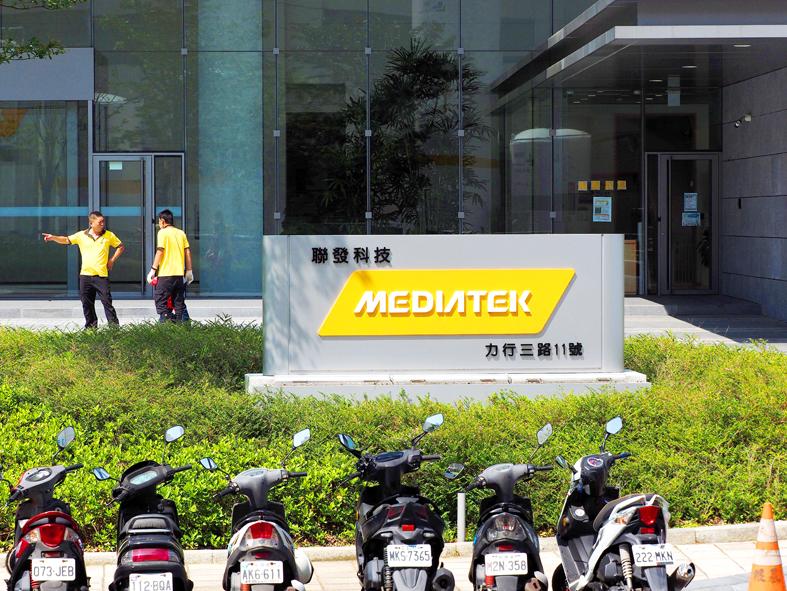MediaTek Inc (聯發科), the world’s largest smartphone chip supplier, on Friday posted 26 percent annual revenue growth to NT$52.08 billion (US$1.76 billion) last month, the third-highest in the company’s history.
On a monthly basis, revenue fell 1.04 percent from NT$52.63 billion in April, the company said in a statement.
The Hsinchu-based chip supplier saw revenue drop for a second straight month after its revenue climbed to a record high of NT$59.18 billion in March.

Photo: David Chang/EPA-EFE
For April and May, MediaTek posted combined revenue of NT$104.71 billion. That means the chipmaker must earn NT$42.29 billion to meet its revenue forecast of between NT$147 billion and NT$157 billion for the second quarter.
Despite growing concern that rising inflation risk and a wobbling global economy could dampen smartphone demand, MediaTek told shareholders last month that it would maintain its revenue growth target over the next three years.
The chipmaker’s optimism is built on the increasing global adoption of 5G smartphones, MediaTek said.
MediaTek expects 5G smartphones to account for 50 percent of all handsets this year, up from 30 percent last year.
Revenue should grow at an annual compound rate of 15 percent over the next three years, the company said.
During the first five months of this year, revenue surged 33 percent. Smartphone chips comprised more than 50 percent of the company’s overall revenue last quarter.
Separately, Taiwan Semiconductor Manufacturing Co (TSMC, 台積電), the world’s largest contract chipmaker, set a new high for monthly sales for a second consecutive month last month, which analysts attributed to robust global demand for new tech applications.
TSMC posted consolidated sales of NT$185.71 billion, up 7.6 percent from a previous high of NT$172.56 billion in April.
Last month’s figure was also up 65.3 percent from a year earlier, company data showed.
In the first five months of the year, TSMC’s consolidated sales totaled NT$849.34 billion, up 44.9 percent from a year earlier, it said.
While global demand for smartphones and other consumer electronic gadgets showed signs of weakening, TSMC continued to benefit from robust demand for high-performance computing devices and automotive electronics last month, analysts said.
Due to the strong demand, TSMC continued to see its capacity utilization rate at record highs, further boosting its shipments during the month, analysts said.
Additional reporting by CNA

The US dollar was trading at NT$29.7 at 10am today on the Taipei Foreign Exchange, as the New Taiwan dollar gained NT$1.364 from the previous close last week. The NT dollar continued to rise today, after surging 3.07 percent on Friday. After opening at NT$30.91, the NT dollar gained more than NT$1 in just 15 minutes, briefly passing the NT$30 mark. Before the US Department of the Treasury's semi-annual currency report came out, expectations that the NT dollar would keep rising were already building. The NT dollar on Friday closed at NT$31.064, up by NT$0.953 — a 3.07 percent single-day gain. Today,

‘SHORT TERM’: The local currency would likely remain strong in the near term, driven by anticipated US trade pressure, capital inflows and expectations of a US Fed rate cut The US dollar is expected to fall below NT$30 in the near term, as traders anticipate increased pressure from Washington for Taiwan to allow the New Taiwan dollar to appreciate, Cathay United Bank (國泰世華銀行) chief economist Lin Chi-chao (林啟超) said. Following a sharp drop in the greenback against the NT dollar on Friday, Lin told the Central News Agency that the local currency is likely to remain strong in the short term, driven in part by market psychology surrounding anticipated US policy pressure. On Friday, the US dollar fell NT$0.953, or 3.07 percent, closing at NT$31.064 — its lowest level since Jan.

Hong Kong authorities ramped up sales of the local dollar as the greenback’s slide threatened the foreign-exchange peg. The Hong Kong Monetary Authority (HKMA) sold a record HK$60.5 billion (US$7.8 billion) of the city’s currency, according to an alert sent on its Bloomberg page yesterday in Asia, after it tested the upper end of its trading band. That added to the HK$56.1 billion of sales versus the greenback since Friday. The rapid intervention signals efforts from the city’s authorities to limit the local currency’s moves within its HK$7.75 to HK$7.85 per US dollar trading band. Heavy sales of the local dollar by

The Financial Supervisory Commission (FSC) yesterday met with some of the nation’s largest insurance companies as a skyrocketing New Taiwan dollar piles pressure on their hundreds of billions of dollars in US bond investments. The commission has asked some life insurance firms, among the biggest Asian holders of US debt, to discuss how the rapidly strengthening NT dollar has impacted their operations, people familiar with the matter said. The meeting took place as the NT dollar jumped as much as 5 percent yesterday, its biggest intraday gain in more than three decades. The local currency surged as exporters rushed to